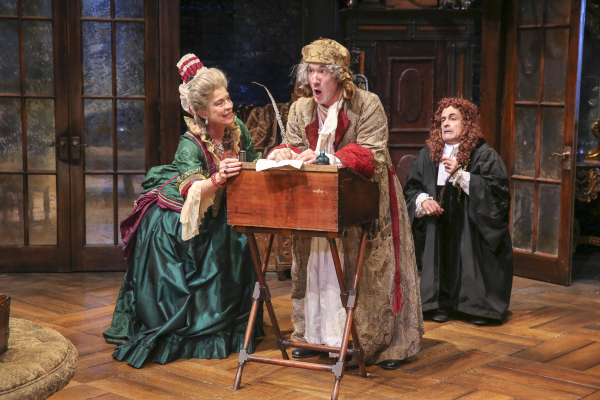The Heir Apparent

(© Richard Termine)
Silly costumes, rhyming couplets, and fart jokes abound in David Ives' The Heir Apparent, which comes to Classic Stage Company following a 2011 world premiere at Washington, DC's Shakespeare Theatre. Like he did with his last Classic Stage outing, The School for Lies (loosely based on Moliere's The Misanthrope), Ives once again takes on the world of Comédie Française. This time the story is borrowed from one of Molière's lesser-known successors: Jean-François Regnard. If you're looking for an irreverent laugh fest with more than a few moments of sublime linguistic brilliance, look no further.
Based on Regnard's 1708 comedy Le Légataire universel, The Heir Apparent takes place in the Paris home of Geronte (Paxton Whitehead), a wealthy old miser worth over a million francs and apparently at death's door. His debt-ridden nephew Eraste (Dave Quay) hopes that Geronte will leave him everything in his will, not least because it is the one condition under which the prune-like Madame Argante (Suzanne Bertish) will allow him to marry her daughter, Isabelle (Amelia Pedlow). As often happens, it comes down to the help to sort it all out: Maid Lisette (Claire Karpen) serves Geronte increasingly powerful laxatives while Eraste's wily manservant Crispin (Carson Elrod, reprising the role he originated in D.C.) puts on the performance of a lifetime playing numerous nieces and nephews and even the old man himself in an effort to get Geronte to name Eraste his sole heir. The scheme looks foolproof until the return appearance of Geronte's diminutive lawyer, the aptly named Scruple (David Pittu), threatens to unravel the whole charade.
Ives has written the entire play in rhyming verse, a Herculean feat considering the fact that English does not rhyme as naturally as French. Only a few couplets feel forced in this two-hour affair, and when they do the references are so off-the-wall ludicrous that they are easily excused. (Who but a comedic madman would think to rhyme "Crimea" with "diarrhea?") Such eloquent toilet humor makes for a zanier experience with an already ridiculous plot.
The actors lean into this cartoonish reality, with Elrod leading the way. His rubbery face and dexterous diction allow him to magically glide through multiple quick-changes and even quicker turns of phrase. "Well, I don’t care what anybody says. / I am a one-man Comédie Française," he proclaims. I don't think anyone would dispute him that claim. As Scruple, Pittu performs the entire show on his knees, sneering under an oversize Louis XIV wig. Whitehead gives a phlegmy performance as the 69-year-old millionaire, never missing a syllable of Ives' verse while simultaneously hacking up a lung.
Director John Rando perfectly paces this well-choreographed lunacy, with exits and entrances rivaling any farce. John Lee Beatty's set is dusty, cluttered, and ancient, like a Williamsburg antique shop. It's full of secrets and hidden treasures, well-employed by the ensemble and director in telling Ives' story. Sound designer Nevin Steinberg bookends the acts with the sound of an electronic harpsichord playing a kind of baroque concerto for Nintendo, subtly hinting at the relevance of this play to our modern era.
But of course, money, death, and family will always be relevant pains in the neck. That's as true today as it was in 1708. By helping us to laugh at these usually-serious themes, Ives carries on a grand tradition of comic playwrights. You'll leave this one with a big grin on your face.










